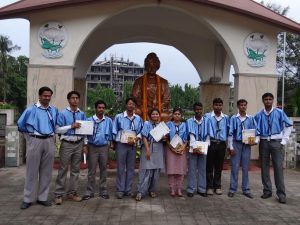The programme is organised in five distinct but mutually supportive learning segments:
Interactive Classroom Sessions (ICS):
ICS involves lectures, special lectures by subject experts, seminars, debates, group discussions, panel discussions, extempore deliberation, class teachings, mini projects, presentation of semester paper, field and laboratory based practical, visit to farmers’ field and different institutions etc. In all the four semesters students are to be given exposure to about 28 compulsory and optional modules/courses comprised of extensive information related to different aspects of rural development and management.
Rural Living and Learning Experience (RLLE):
The most essential component of the programme is to bridge the divide between academics and application by generating willingness among the students for rural living and to develop the inquisitive process of learning leading to action through participation in villagers’ day-to-day activities. The interactive involvement with the villagers in different institutional contexts would expand the innovative qualities of the students. RLLE is, therefore, an indispensable pedagogical component of the IRDM programmes.
Learning through Organizational Attachment (LOA):
LOA provides students with the knowledge of practical work and learning opportunity. It attempts to prepare the students with more effective techniques, better decision-making abilities, instill in them the vigour of approach in productivity, excellence and innovation. It exposes the students to real life situations and provides them with opportunities to apply the concepts learnt in the classroom in actual situations. It also helps them to develop innovative target-oriented solutions to the major issues faced by the organization and address strategy formulation as well as operational and functional problems. The duration of LOA would be of 2 weeks and 8 weeks during 2nd and 4th semester respectively.
On the Job Training:
With the same objectives of LOA, there may be an optional ‘On the job training programme’ for 3 months after the completion of the final examination including viva-voce at the end of the 4th semester. A token stipend may be given to the students undergoing this optional training programme (Subjects to the approval).
Dissertation work and scientific research paper:
Each student will give a preliminary seminar after the 2nd semester on proposed plan of dissertation work and will work on that topic throughout the 3rd and 4th semesters. Students have to give another seminar at the end 4th semester on his/her dissertation work. Students have to submit a scientific paper for publishing in a peer reviewed journal along with their dissertation report.
Associative academic activities in all the semesters:
l Seminars, talks, debates, group discussions, panel discussion, quizzes, class teaching exercises, extempore presentations, village meetings etc. l Report writing and presentation. l Unit tests, final examinations at the end of each semester, short field visits and institutional visits. l Organising stalls and demonstrations in kishan mela. l Comprehensive test during 4th semester. No grade will be given but students have to qualify in that test.
 Learning Objectives and Expected Outcomes: ‘Integrated Rural Development and Management (IRDM)’ offers a rigorous, interdisciplinary, experiential curriculum designed to prepare future leaders to respond to developmental opportunities and challenges in the rural uplift programmes. It tries to make students fit and knowledgeable in the understanding of certain important issues in integrated rural development. Students completing the MSc./MA programme in IRDM are expected to develop skills in the following.
Learning Objectives and Expected Outcomes: ‘Integrated Rural Development and Management (IRDM)’ offers a rigorous, interdisciplinary, experiential curriculum designed to prepare future leaders to respond to developmental opportunities and challenges in the rural uplift programmes. It tries to make students fit and knowledgeable in the understanding of certain important issues in integrated rural development. Students completing the MSc./MA programme in IRDM are expected to develop skills in the following.
- Knowledge of rural systems: Understand the structure, function, and integration of the rural society with a thrust on integrated rural development.
- Interdisciplinary approach: Apply an interdisciplinary approach to the study of the rural environment and its development, integrating multiple kinds of information, tools, methods, and scholarship from a variety of disciplines in order to analyze and construct arguments about complex rural issues.
- Experiential Learning: Understand the connections between classroom and experiential learning and successfully practice multiple forms of real world applications.
- Decision Making: Understand how uncertainty, risk, ethics, economics, and culture interact with rural development and decision making.
- Teamwork: Collaborate as members of teams, effectively working with multiple stakeholders from various backgrounds to address rural developmental issues.
- Technical Knowledge: To be familiar with some of the technological tools commonly used to address rural developmental challenges.
- Professional Development: To provide opportunity to the Govt., Corporate and Private sectors with the skill of professionals in the field of rural development.
- Self-employment: Empower students for self-employment through rural entrepreneurship, establishing rural agro-clinics, etc.

